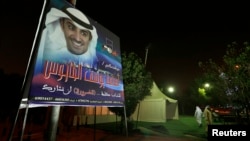KUWAIT —
Kuwaitis will be voting for a new parliament on Saturday for the third time since the Arab Spring uprisings of 2011. The election follows protracted political tension in the Gulf state, and observers say it is unlikely to help mend deep-rooted divisions within the country.
A Kuwaiti court in June called for the new poll after deeming the parliament elected in December 2012 unconstitutional. The decision came one year after the previous opposition-led assembly was dissolved for other irregularities, a move that sparked major street protests.
While Kuwait has avoided sustained unrest like that recently seen in other Arab nations, many citizens frustrated by political deadlock have been publicly voicing their grievances and demanding governmental reform.
Late last year, the country witnessed some of the largest demonstrations in its history when tens of thousands of people took to the streets to denounce a major change to voting procedures.
The new rule, which was handed down directly by the emir, reduces the number of votes each citizen can cast in parliamentary elections from four to one.
Supporters say the change is aimed at preventing future political stalemate; opponents say it stops the opposition from forming a majority in parliament.
The amendment has been upheld for Saturday’s poll and several opposition groups are boycotting the election as a result.
Shafeeq Ghabra, a professor of political science at Kuwait University, said voter turnout also is expected to be low.
"People have cold feet when it comes to this election and some are assuming that this existing parliament to be elected will not also last for more than a year," said Ghabra.
Kuwait’s political system is the most open in the Gulf, with members of parliament allowed to pass legislation and question Cabinet ministers chosen by the emir.
Constant disputes between parliamentarians and ministers, however, have been hindering economic reform and development.
Despite being one of the richest countries per capita thanks to its vast oil wealth, Kuwait lags behind most of its Gulf neighbors when it comes to initiating new modernization projects.
Ahmed al-Obaid, a student at the American University of Kuwait and a voter, said modernization is an important issue among many Kuwaitis his age.
"We want the government to build something for Kuwaiti people such as the universities, the hospitals. We want to be like neighboring countries, such as Dubai, Qatar, Saudi Arabia," he said.
Kuwait-based economist Hajjaj Bokhdour said the country has tremendous potential.
"The economical problem in Kuwait is not because of the resources, is not because of the [lack of] opportunities, it is because of management," said Bokhdour.
The upcoming election will see 50 parliamentarians selected from five constituencies.
According to the Ministry of Information, more than 300 candidates will be vying for seats. As political parties are outlawed in Kuwait, all are running on an individual basis.
Despite the parliament’s relatively strong powers, the emir still has the final say in all state affairs.
A Kuwaiti court in June called for the new poll after deeming the parliament elected in December 2012 unconstitutional. The decision came one year after the previous opposition-led assembly was dissolved for other irregularities, a move that sparked major street protests.
While Kuwait has avoided sustained unrest like that recently seen in other Arab nations, many citizens frustrated by political deadlock have been publicly voicing their grievances and demanding governmental reform.
Late last year, the country witnessed some of the largest demonstrations in its history when tens of thousands of people took to the streets to denounce a major change to voting procedures.
The new rule, which was handed down directly by the emir, reduces the number of votes each citizen can cast in parliamentary elections from four to one.
Supporters say the change is aimed at preventing future political stalemate; opponents say it stops the opposition from forming a majority in parliament.
The amendment has been upheld for Saturday’s poll and several opposition groups are boycotting the election as a result.
Shafeeq Ghabra, a professor of political science at Kuwait University, said voter turnout also is expected to be low.
"People have cold feet when it comes to this election and some are assuming that this existing parliament to be elected will not also last for more than a year," said Ghabra.
Kuwait’s political system is the most open in the Gulf, with members of parliament allowed to pass legislation and question Cabinet ministers chosen by the emir.
Constant disputes between parliamentarians and ministers, however, have been hindering economic reform and development.
Despite being one of the richest countries per capita thanks to its vast oil wealth, Kuwait lags behind most of its Gulf neighbors when it comes to initiating new modernization projects.
Ahmed al-Obaid, a student at the American University of Kuwait and a voter, said modernization is an important issue among many Kuwaitis his age.
"We want the government to build something for Kuwaiti people such as the universities, the hospitals. We want to be like neighboring countries, such as Dubai, Qatar, Saudi Arabia," he said.
Kuwait-based economist Hajjaj Bokhdour said the country has tremendous potential.
"The economical problem in Kuwait is not because of the resources, is not because of the [lack of] opportunities, it is because of management," said Bokhdour.
The upcoming election will see 50 parliamentarians selected from five constituencies.
According to the Ministry of Information, more than 300 candidates will be vying for seats. As political parties are outlawed in Kuwait, all are running on an individual basis.
Despite the parliament’s relatively strong powers, the emir still has the final say in all state affairs.








